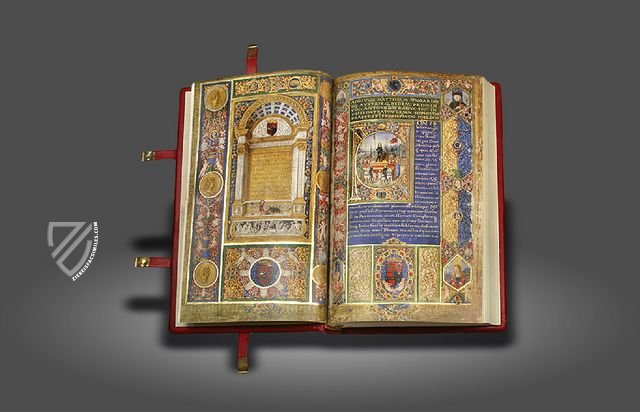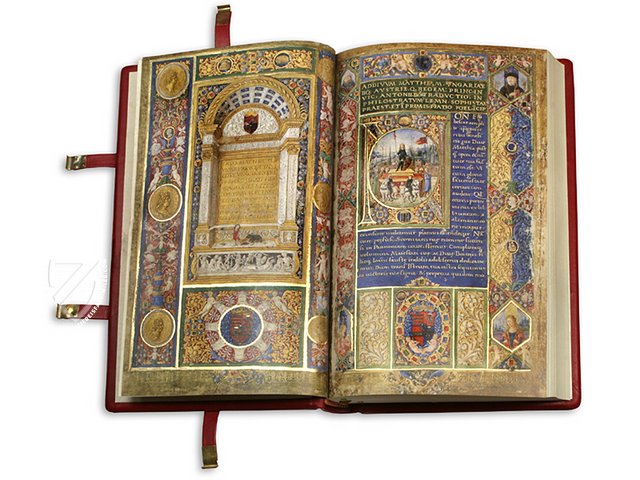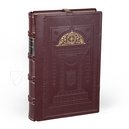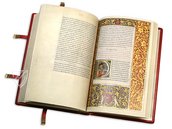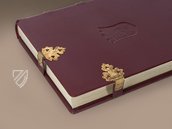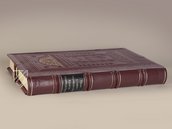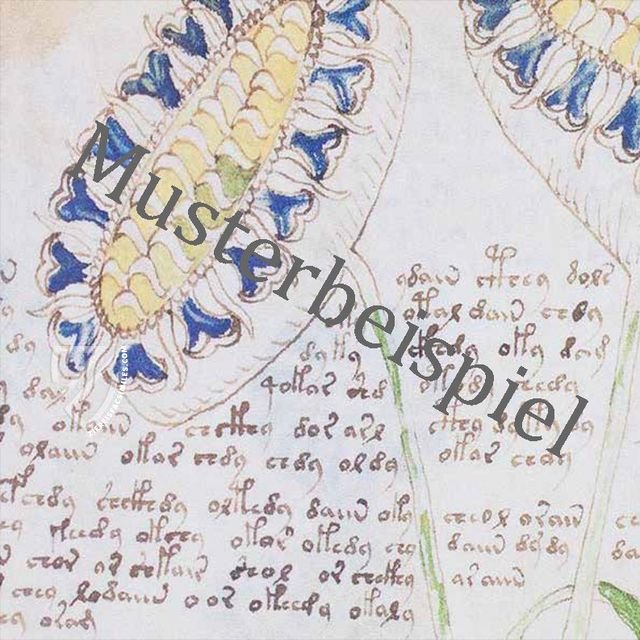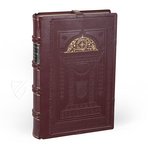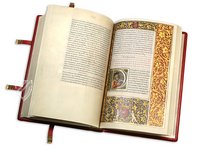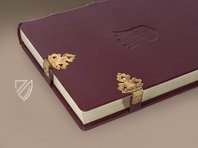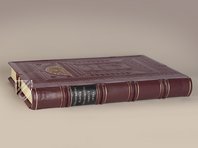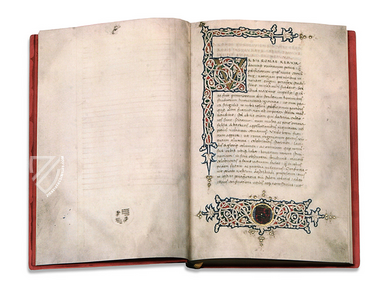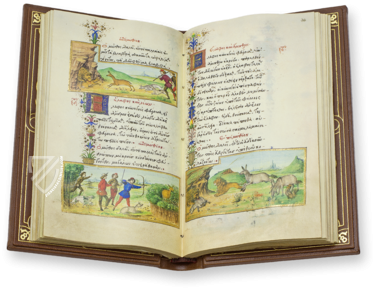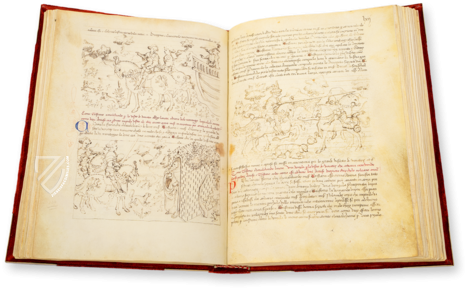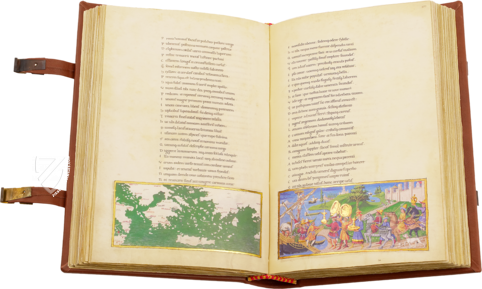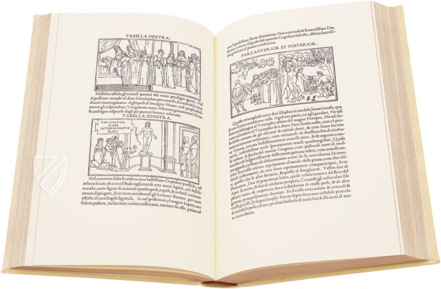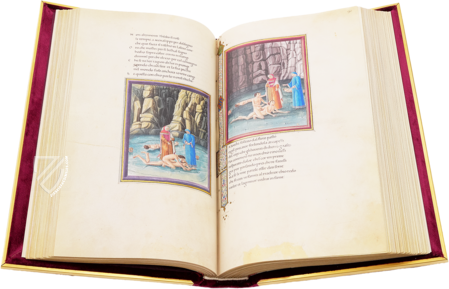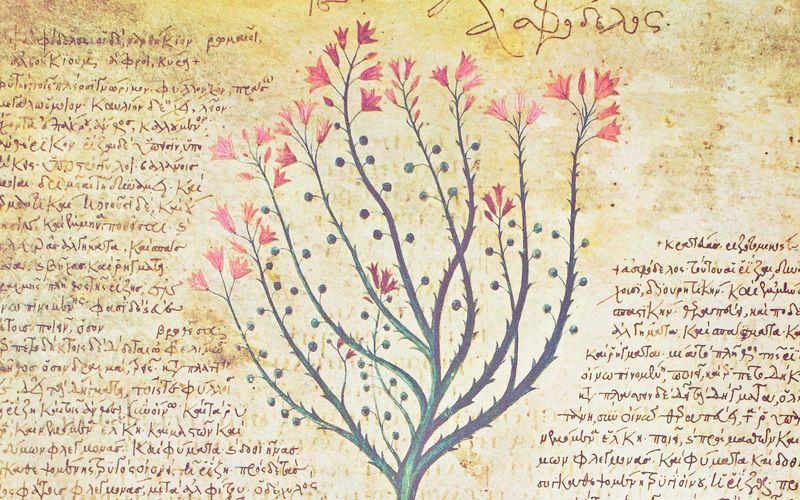Philostratus Flavius: Opera
(1,000€ - 3,000€)
The Bibliotheca Corviniana or Corvina Library was the greatest secular library of Renaissance Europe and was created by the one of the most powerful and well-educated monarchs of the period – Matthias Corvinus, King of Hungary and Croatia. Burned by the Ottoman Turks in the aftermath of the Battle of Mohács in 1526, its loss was lamented across Europe, but some of its bibliographic treasures managed to be saved. Among these is a finely illuminated manuscript containing a curriculum vitae of ancient heroes and philosophers, letters, and the description of an art collection in Naples. It is one of the most beautiful specimens to survive from this famous library.
Philostratus Flavius: Opera
King Matthias Corvinus (23 February 1443 – 6 April 1490) was one of the most powerful rulers of Renaissance Europe as King of Hungary and Croatia. Educated in Italian and a great admirer of Italian renaissance art, he collected a library consisting of about 3,000 volumes called the Bibliotheca Corviniana. The Codex Philostratus Philostratus Flavius – Philostratus Lemnius Opera Cod. Lat. 417. (Florence, 1487–1490, parchment) is a piece of this collection, which contains the works of the sophist Philostratus of Athens and of his nephew (3rd c. AD.) In the book we find the curriculum vitae of ancient heroes and philosophers, letters, and the description of an art collection in Naples.
A Library Worthy of a King
The Philostratus Corvina is one of the most finely decorated codices of the Corvina Library. Its importance is unique: the translation, dedication, the splendid manuscript itself, from the first letter till the last brush stroke was created for King Matthias. The court historian Antonio Bonfini translated the work of the Athenian Sophist Philostratos (3rd century AD) and his nephew, from Greek into Latin in the spring of 1487. The illustrations were made in Florence, in the workshop of Boccardino il Vecchio. The manuscript reached Buda from Florence in Matthias’ lifetime, but the leather binding with architectural ornamentation bears the arms of his successor, Vladislaus II. In 1513, the Corvina Library was bought from Vladislaus II by the Viennese humanist Johannes Gremper, then finding its way to Johannes Cuspinianus, and later to Johannes Fabri. It was transferred from the Austrian National Library to the National Széchényi Library per the framework of the Venice Agreement in 1932.
Incredible Double-Page Depictions
All seven of the carefully arranged, predominantly red, blue, and gilded diptych-like double-pages are covered in finely executed miniatures: even the margins of pages, usually kept white, are painted in yellowish green with lace-like gilding. On the left-hand side you can read the contents index of the codex in the form of a monumental inscription: the gilded bronze sheet with embossed letters is in the frame of a white stone niche. On the pedestal of the building there is the imitation of an antique relief depicting a fight among sea gods. On the left, King Matthias’s antique-like medallion portrait appears surrounded by white putti and hanging arms, having the portraits of Nero and Hadrian, the two Roman emperors especially predisposed to Greek culture, on his two sides. (The caption in the medal calls Matthias, King of Hungary and Bohemia and Prince of Austria.) In the middle of the other side, there is the imitation of an oval bronze relief, showing Apollo, Olympus and Marsyas, modelled on a famous antique carnelian-intaglio (an engraved semi-precious gemstone) in Lorenzo de’ Medici’s art collection. There is a triumphal procession on the initial of the page on the right-hand side. The tiny crowned figure on the chariot has been identified as Matthias inter alia, while in other cases as his son János Corvin. The prologue actually describes the triumph celebrating the conquest of Wiener Neustadt. Both pages have Matthias’s coat of arms at the bottom (on the right, the shield also features Austria’s silver-swathed crest against a red background.) The ornaments on the margins feature the royal emblems (a beehive, a barrel, an hour-glass, a dragon and a well).
Codicology
- Alternative Titles
- Codex Philostratus
Philostratus Flavius
Philostratus Lemnius Opera
Philostratus Corvina
Philostratus: Heroica - Size / Format
- 204 pages / 37.8 × 22.2 cm
- Origin
- Italy
- Date
- 1487–90
- Epochs
- Style
- Genre
- Language
- Script
- Humanistic rotunda
- Illustrations
- 8 full-page miniatures including a portrait of Matthias Corvinus, 158 initials, and splendid decorative borders
- Content
- The works of the 3rd century Athenian Sophist Philostratos and his nephew in addition to letters and a description of an art collection in Naples
- Patron
- Matthias Corvinus, King of Hungary and Croatia (1443–90)
- Artist / School
- Boccardino il Vecchio (d. 1542)
Florentine school - Previous Owners
- Wladislas II, King of Bohemia, Hungary and Croatia (1456–1516)
Johannes Gremper (d. after 1519)
Johannes Cuspinianus (1473–1529)
Johann Faber, Bishop of Vienna (1478–1541)
Saint Michael’s College of Vienna University
Österreichische Nationalbibliothek (Vienna, Austria)
#1 Philostratus Flavius: Opera
(1,000€ - 3,000€)
#2 The Philostratus Corvina
- Treatises / Secular Books
- Apocalypses / Beatus
- Astronomy / Astrology
- Bestiaries
- Bibles / Gospels
- Chronicles / History / Law
- Geography / Maps
- Saints' Lives
- Islam / Oriental
- Judaism / Hebrew
- Single Leaf Collections
- Leonardo da Vinci
- Literature / Poetry
- Liturgical Manuscripts
- Medicine / Botany / Alchemy
- Music
- Mythology / Prophecies
- Psalters
- Other Religious Books
- Games / Hunting
- Private Devotion Books
- Other Genres
- Afghanistan
- Armenia
- Austria
- Belgium
- Belize
- Bosnia and Herzegovina
- China
- Colombia
- Costa Rica
- Croatia
- Cyprus
- Czech Republic
- Denmark
- Egypt
- El Salvador
- Ethiopia
- France
- Germany
- Greece
- Guatemala
- Honduras
- Hungary
- India
- Iran
- Iraq
- Israel
- Italy
- Japan
- Jordan
- Kazakhstan
- Kyrgyzstan
- Lebanon
- Liechtenstein
- Luxembourg
- Mexico
- Morocco
- Netherlands
- Palestine
- Panama
- Peru
- Poland
- Portugal
- Romania
- Russia
- Serbia
- Spain
- Sri Lanka
- Sweden
- Switzerland
- Syria
- Tajikistan
- Turkey
- Turkmenistan
- Ukraine
- United Kingdom
- United States
- Uzbekistan
- Vatican City
- A. Oosthoek, van Holkema & Warendorf
- Aboca Museum
- Ajuntament de Valencia
- Akademie Verlag
- Akademische Druck- u. Verlagsanstalt (ADEVA)
- Aldo Ausilio Editore - Bottega d’Erasmo
- Alecto Historical Editions
- Alkuin Verlag
- Almqvist & Wiksell
- Amilcare Pizzi
- Andreas & Andreas Verlagsbuchhandlung
- Archa 90
- Archiv Verlag
- Archivi Edizioni
- Arnold Verlag
- ARS
- Ars Magna
- Art Market
- ArtCodex
- AyN Ediciones
- Azimuth Editions
- Badenia Verlag
- Bärenreiter-Verlag
- Belser Verlag
- Belser Verlag / WK Wertkontor
- Benziger Verlag
- Bernardinum Wydawnictwo
- BiblioGemma
- Biblioteca Apostolica Vaticana (Vaticanstadt, Vaticanstadt)
- Bibliotheca Palatina Faksimile Verlag
- Bibliotheca Rara
- Boydell & Brewer
- Bramante Edizioni
- Bredius Genootschap
- Brepols Publishers
- British Library
- C. Weckesser
- Caixa Catalunya
- Canesi
- CAPSA, Ars Scriptoria
- Caratzas Brothers, Publishers
- Carus Verlag
- Casamassima Libri
- Centrum Cartographie Verlag GmbH
- Chavane Verlag
- Christian Brandstätter Verlag
- Circulo Cientifico
- Club Bibliófilo Versol
- Club du Livre
- CM Editores
- Collegium Graphicum
- Collezione Apocrifa Da Vinci
- Comissão Nacional para as Comemorações dos Descobrimentos Portugueses
- Coron Verlag
- Corvina
- CTHS
- D. S. Brewer
- Damon
- De Agostini/UTET
- De Nederlandsche Boekhandel
- De Schutter
- Deuschle & Stemmle
- Deutscher Verlag für Kunstwissenschaft
- DIAMM
- Dropmore Press
- Droz
- E. Schreiber Graphische Kunstanstalten
- Ediciones Boreal
- Ediciones Grial
- Ediclube
- Edições Inapa
- Edilan
- Editalia
- Edition Deuschle
- Edition Georg Popp
- Edition Leipzig
- Edition Libri Illustri
- Editiones Reales Sitios S. L.
- Éditions de l'Oiseau Lyre
- Editions Medicina Rara
- Editorial Casariego
- Editorial Mintzoa
- Editrice Antenore
- Editrice Velar
- Edizioni Edison
- Egeria, S.L.
- Eikon Editores
- Electa
- Emery Walker Limited
- Enciclopèdia Catalana
- Eos-Verlag
- Ephesus Publishing
- Ernst Battenberg
- Eugrammia Press
- Extraordinary Editions
- Fackelverlag
- Facsimila Art & Edition
- Facsimile Editions Ltd.
- Facsimilia Art & Edition Ebert KG
- Faksimile Verlag
- Feuermann Verlag
- Folger Shakespeare Library
- Franco Cosimo Panini Editore
- Friedrich Wittig Verlag
- Fundación Hullera Vasco-Leonesa
- G. Braziller
- Gabriele Mazzotta Editore
- Gebr. Mann Verlag
- Gesellschaft für graphische Industrie
- Getty Research Institute
- Giovanni Domenico de Rossi
- Giunti Editore
- Graffiti
- Grafica European Center of Fine Arts
- Guido Pressler
- Guillermo Blazquez
- Gustav Kiepenheuer
- H. N. Abrams
- Harrassowitz
- Harvard University Press
- Helikon
- Hendrickson Publishers
- Henning Oppermann
- Herder Verlag
- Hes & De Graaf Publishers
- Hoepli
- Holbein-Verlag
- Houghton Library
- Hugo Schmidt Verlag
- Idion Verlag
- Il Bulino, edizioni d'arte
- ILte
- Imago
- Insel Verlag
- Insel-Verlag Anton Kippenberger
- Instituto de Estudios Altoaragoneses
- Instituto Nacional de Antropología e Historia
- Introligatornia Budnik Jerzy
- Istituto dell'Enciclopedia Italiana - Treccani
- Istituto Ellenico di Studi Bizantini e Postbizantini
- Istituto Geografico De Agostini
- Istituto Poligrafico e Zecca dello Stato
- Italarte Art Establishments
- Jan Thorbecke Verlag
- Johnson Reprint Corporation
- Johnson Reprint Corporation
- Josef Stocker
- Josef Stocker-Schmid
- Jugoslavija
- Karl W. Hiersemann
- Kasper Straube
- Kaydeda Ediciones
- Kindler Verlag / Coron Verlag
- Kodansha International Ltd.
- Konrad Kölbl Verlag
- Kurt Wolff Verlag
- La Liberia dello Stato
- La Linea Editrice
- La Meta Editore
- Lambert Schneider
- Landeskreditbank Baden-Württemberg
- Leo S. Olschki
- Les Incunables
- Liber Artis
- Library of Congress
- Libreria Musicale Italiana
- Lichtdruck
- Lito Immagine Editore
- Lumen Artis
- Lund Humphries
- M. Moleiro Editor
- Maison des Sciences de l'homme et de la société de Poitiers
- Manuscriptum
- Martinus Nijhoff
- Maruzen-Yushodo Co. Ltd.
- MASA
- Massada Publishers
- McGraw-Hill
- Metropolitan Museum of Art
- Militos
- Millennium Liber
- Müller & Schindler
- Nahar - Stavit
- Nahar and Steimatzky
- National Library of Wales
- Neri Pozza
- Nova Charta
- Oceanum Verlag
- Odeon
- Omnia Arte
- Orbis Mediaevalis
- Orbis Pictus
- Österreichische Staatsdruckerei
- Oxford University Press
- Pageant Books
- Parzellers Buchverlag
- Patrimonio Ediciones
- Pattloch Verlag
- PIAF
- Pieper Verlag
- Plon-Nourrit et cie
- Poligrafiche Bolis
- Presses Universitaires de Strasbourg
- Prestel Verlag
- Princeton University Press
- Prisma Verlag
- Priuli & Verlucca, editori
- Pro Sport Verlag
- Propyläen Verlag
- Pytheas Books
- Quaternio Verlag Luzern
- Reales Sitios
- Recht-Verlag
- Reichert Verlag
- Reichsdruckerei
- Reprint Verlag
- Riehn & Reusch
- Roberto Vattori Editore
- Rosenkilde and Bagger
- Roxburghe Club
- Salerno Editrice
- Saltellus Press
- Sandoz
- Sarajevo Svjetlost
- Schöck ArtPrint Kft.
- Schulsinger Brothers
- Scolar Press
- Scrinium
- Scripta Maneant
- Scriptorium
- Shazar
- Siloé, arte y bibliofilia
- SISMEL - Edizioni del Galluzzo
- Sociedad Mexicana de Antropología
- Société des Bibliophiles & Iconophiles de Belgique
- Soncin Publishing
- Sorli Ediciones
- Stainer and Bell
- Studer
- Styria Verlag
- Sumptibus Pragopress
- Szegedi Tudomànyegyetem
- Taberna Libraria
- Tarshish Books
- Taschen
- Tempus Libri
- Testimonio Compañía Editorial
- TGB Limited Editions
- Thames and Hudson
- The Clear Vue Publishing Partnership Limited
- The Facsimile Codex
- The Folio Society
- The Marquess of Normanby
- The Richard III and Yorkist History Trust
- Tip.Le.Co
- TouchArt
- TREC Publishing House
- TRI Publishing Co.
- Trident Editore
- Tuliba Collection
- Typis Regiae Officinae Polygraphicae
- Union Verlag Berlin
- Universidad de Granada
- Universitaire Bibliotheken Leiden
- University of California Press
- University of Chicago Press
- Urs Graf
- Vallecchi
- Van Wijnen
- VCH, Acta Humaniora
- VDI Verlag
- VEB Deutscher Verlag für Musik
- Verlag Anton Pustet / Andreas Verlag
- Verlag Bibliophile Drucke Josef Stocker
- Verlag der Münchner Drucke
- Verlag für Regionalgeschichte
- Verlag Styria
- Vicent Garcia Editores
- W. Turnowski Ltd.
- W. Turnowsky
- Waanders Printers
- Wiener Mechitharisten-Congregation (Wien, Österreich)
- Wissenschaftliche Buchgesellschaft
- Wissenschaftliche Verlagsgesellschaft
- Wydawnictwo Dolnoslaskie
- Xuntanza Editorial
- Zakład Narodowy
- Zollikofer AG

